Q/A with Chia Xiong at Three Rivers Park District
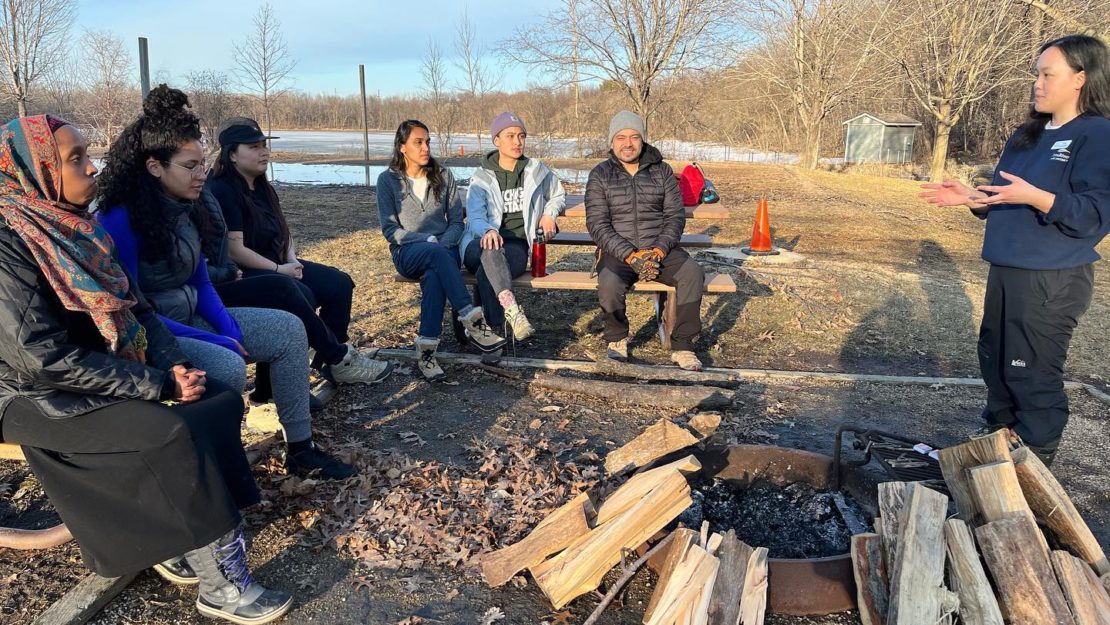
This Asian American and Pacific Islander Heritage Month, we reached out to collaborate with and share stories from AAPI members of our outdoors community. We met with Chia Xiong, a Community Engagement Coordinator at Three Rivers Park District. Three Rivers is a long-time partner of Conservation Corps Minnesota & Iowa.
What do you do with Three Rivers Parks District?
I am a Community Engagement Coordinator within the Marketing and Community Engagement Department. Our role within the Park District is to connect with underrepresented populations in suburban Hennepin County.
When we say underrepresented populations, we’re talking about low-income households; we’re talking about Black, Indigenous, and people of color (BIPOC); we’re talking about teens as well as senior populations; and the intersection between all those different populations as well.
Within our work team, we all have different programs that we specialize in. One for me is the Pathways Internship Program: this is offering paid internship opportunities for young people to come and explore a career in the Parks and Rec, and in government.
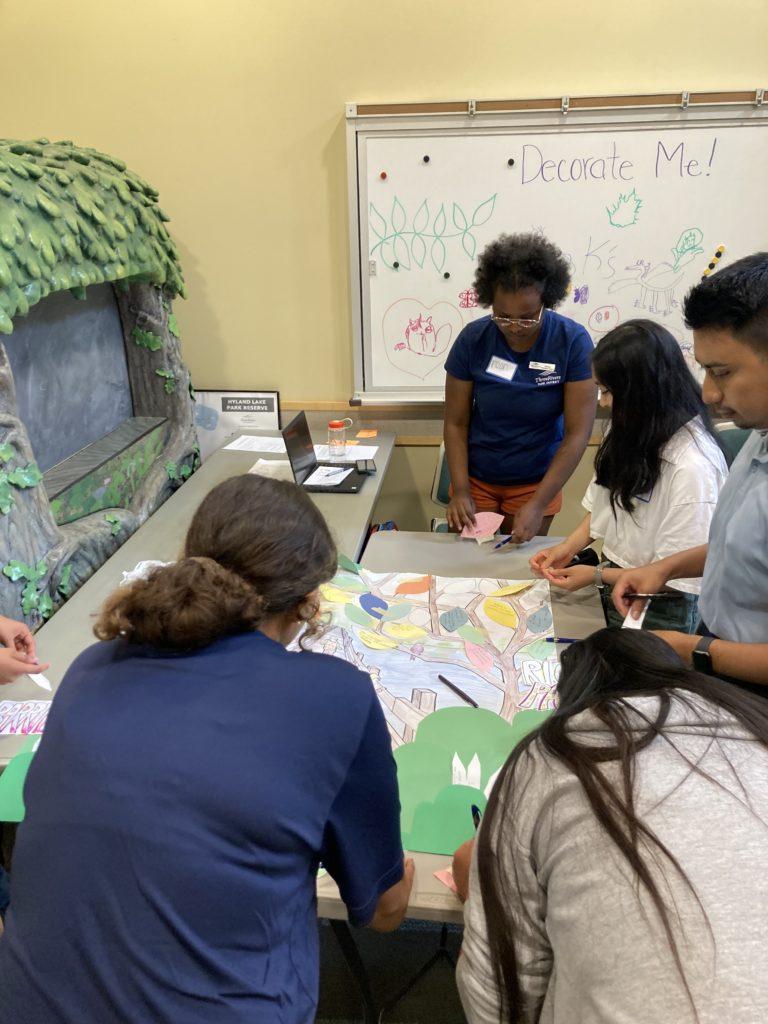
We target young people facing barriers to employment, whether they are working for the first time, they’re in a non-English speaking family, or they are in free/reduced lunch. We open it to all other folks as well, prioritizing folks who have some barriers to employment. We’re looking to place about 20-some young people into different opportunities that range from all over the Park District. As part of the program, we do development days where we learn and talk about employment, such as: how do you create an elevator speech? How do you take the things that you’re doing and your internship and put it on your resume? Or it’s shadowing opportunities too.
Secondly, the other huge part of my role within the Park District is our Camping Gear initiative.
This is an introductory camping experience at our campgrounds for families and groups with limited financial resources and for Black, Indigenous, and people of color. We provide what’s called our camping gear kits, where we provide basic camping gear such as tents, sleeping pads, cookstoves, lanterns, and roasting sticks for s’mores and hot dogs.
We have a lot of fee assistance to provide these camping opportunities for just about anyone who’s interested, especially if it’s their first time camping. I know sometimes they might have gear, but maybe their extended family or friends don’t have gear and they want to bring their family out. So that’s a really great bridge as well.
Those are the different areas that I oversee. And right now, I’m the interim supervisor while my supervisor is out on maternity leave. So, lots of different things are happening.
You also mentioned that you do a lot outside of your work with Three Rivers?
One in particular is connecting with the BIPOC Outdoors Twin Cities Facebook group. I really wanted to talk about that because they are a really great network of people who are just wanting to get others outdoors. There is a good group of folks within it as well who are outdoor professionals, who are BIPOC in the field, and are really trying to get more folks from the BIPOC community into the outdoors, whether that’s through careers, or it’s program-specific by the BIPOC community.
Asha Shoffner, who’s been a huge lead in the BIPOC Outdoors Group, has been taking this huge drive on putting this group together. I so appreciate Asha for doing that and just being able to reach back out to the group about different things.
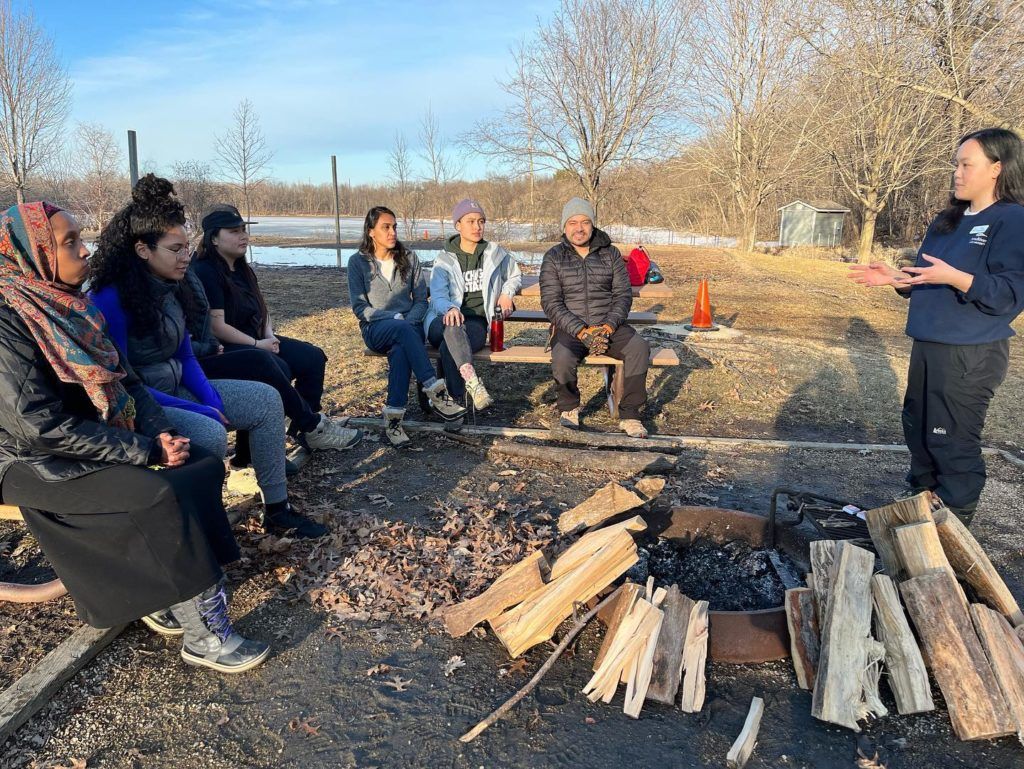
It was right on the cusp of winter when we did winter camping for the BIPOC Outdoors group to come out to Cleary Lake. Many of the folks who were there have gone camping but have never in the winter. We were sort of at the cusp of spring and winter because it was actually a really warm weekend. We were maybe expecting a little bit more cold. But, I think it was a really great experience regardless. And a lot of folks who were like, “Yeah, we should do more camping trips together,” and trying to figure out dates for the summer to come out and do more outdoors camping together.
Another huge part of work I have is the Hmong Women and Queer Outdoors Group. This started actually within Three Rivers through a Hennepin County SHIP Grant. They helped to pilot the program, and now it’s sort of been its own entity.
Me and Konnie Her have been coordinating that group together. So far we were afforded to do some hiking, archery, an overnight retreat, and cross-country skiing this winter. There were a lot of first-time skiers that came out for that particular event. We are hoping to do more this summer, whether it’s around biking and camping and possibly another retreat in the late summer or fall.
What makes this work important to you?
One thing that I didn’t fully expand on is some of the actual work that I do within the Park District around equity. It’s working with the leadership team or other supervisors about how we rethink hiring more BIPOC individuals and diverse candidates?
Another thing is around translation within Three Rivers. We’ve been doing a lot to try to translate some materials and things that we’re trying to promote. For me, being a Hmong American woman, it means a lot to me in terms of, how do I make sure that other communities are also seeing what I’m seeing in the outdoors?
I talk a lot about – my background actually isn’t in the outdoors. It’s really in public health and in community. Luckily, I grew up pretty close to Mississippi Gateway Regional Park. We were there all the time with family in Brooklyn Park. So, I had that connection growing up, but we didn’t go there often just because maybe it was a little farther away and fees back then. I think for me, the importance is really the fact that I’m in this work. Part of the reason why I took over the Pathways Internship Program is really thinking about young folks who may or may not be thinking about work in the outdoors. But the importance to me is just being able to diversify.
You mentioned your background in public health, how did that lead you to where you are today?
I got my Bachelor’s degree over at the University of St. Thomas, focused on geography and health education. That was a way for me to look at community in a very different way, population health and things like that. Then I ended up going to the University of Michigan, Ann Arbor, for my Master’s of Public Health (MPH). In the program that I was a part of is called Health Behavior and Health Education and it was focused on communities. It was focused on how to engage and do outreach in the community around health. But also, the other side of it was cultural humility. How do you translate documents? How do you make sure that the programs are culturally appropriate for that community? So, that “how do I work with the community through this” lens actually helped me to find my way into community engagement at the Park District.
So, it’s those soft skills, and some hard skills, that I learned in public health that helped me gear towards the work that I do today.
What were some of your early experiences in the outdoors?
When I think about the outdoors and growing up in Brooklyn Park, it was hanging out in the front yard with friends or it was going to the city park that is three blocks away from my parent’s house. You know, it was picnic areas where we can go and gather a huge group, like extended family to come out and barbecue and have some time together.
The first time I went to a National Park was out at Yellowstone. That was a total anomaly. We were driving through that area from Colorado visiting family. We stopped on our way home. We only went there because an uncle was like, “Yeah, you should make a stop out in Yellowstone.”
This was in my teens. So, this is my very first time going to a National Park, which is amazing. But Yellowstone itself is a super popular place. Feeling safe to go there because you’re surrounded by people. You’re not in the middle of nowhere. That was a really great first time experience I think, for my family to be out there.
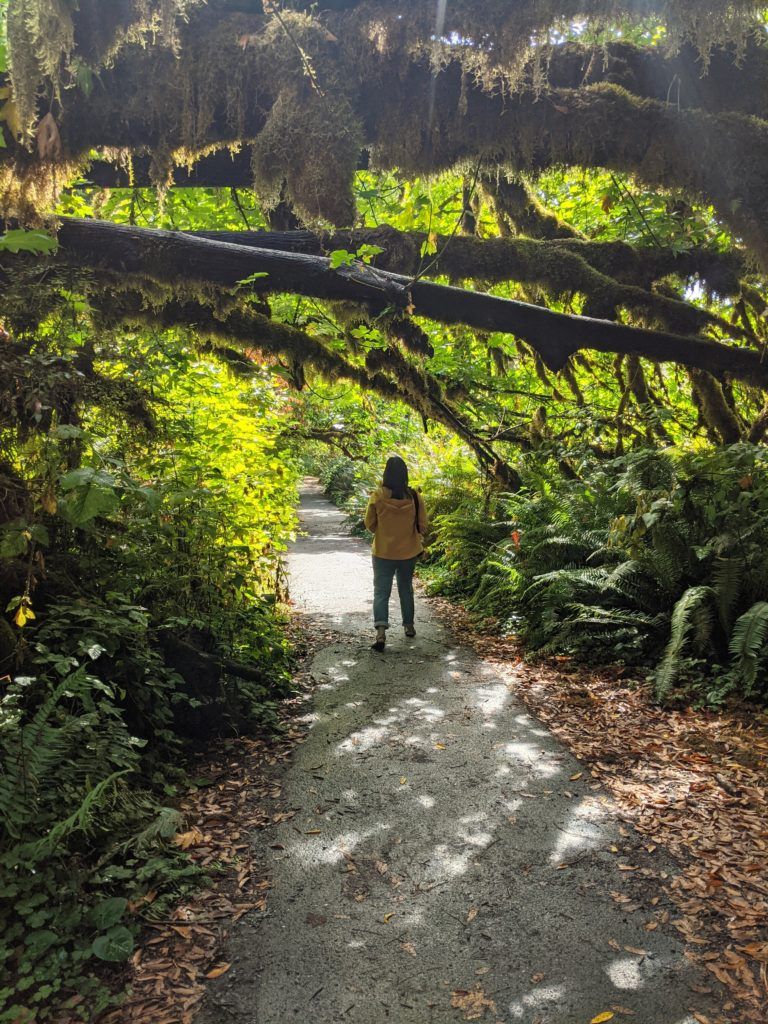
But as an adult now going to places on my own. I’ve gone to other National Parks. I’ve gone to National Forests where you sometimes are the only person in a one-to-two-mile radius. Not knowing when you’re going to see a person on the trail is a very different experience. I think it’s a growing experience to feel comfortable in the outdoors as you’re growing up. But being able to do that as an adult is very different.
How have those experiences shaped the work you do now?
I think it’s extending those opportunities to other families, right? I think about myself and being a young kid and having parents who are working almost all the time. How do we find those instances, or those families who are in that same kind of experience right now and provide them with opportunities to get them in. Whether it’s on a weekend, it’s providing free programs for them to come out to, sometimes it’s with the Hmong Women and Queer Outdoors Group. They’ve been asking to go out to the Boundary Waters, and I’m like, I have no experience in the Boundary Waters, but let’s figure out a way for us to get out there, because if that’s what you’re asking for, we can try to make it happen.
We’re providing opportunities and allowing them to work towards coming out on their own. We always say at Three Rivers Park District, all our parks are free to enter, there’s no fee for parking. But we understand that not everyone, even if it’s free to come to, is going to come to our locations. So, how do you create those baby steps to get them to that point. It has been really helpful to gauge where the community is, to gauge how we can be working with everyone else to make sure that they’re feeling comfortable, feeling safe in our parks as well.
Over the past several years, how have you seen the impact of your work?
We’ve definitely shifted and grown what our team does. Six years ago, it was literally me and my supervisor. Now we have two other full-time coordinators. We also have cultural and community liaisons who work part-time for us as well.
I think another part of it is finding opportunities to bring community engagement into other departments in the Park District. Years ago I had gone to a conference, and one of the committee’s concepts that they talked about at the conference was employee resource groups. So, thinking about affinity groups within organizations to have spaces for them to meet whether it’s networking, connecting, or supporting one another.
So, I helped Three Rivers start Employee Resource Groups. We have one that’s our umbrella group, called the Diversity Equity and Inclusion Employee Resource Group. I oversee the BIPOC group. We have one geared towards parents in the Park District. Variations of groups within our staff to have opportunities to talk about struggles. To talk about what are some resources that we have throughout the Park District or outside of work as well, resources in the community that we can connect to. Being able to have those opportunities for folks to come together and have that space.
Is there anything else that you wanted to share?
I’ve talked to a lot of our pathways interns around ideas of working in the outdoors. The one thing I always tell them is, “it’s OK if you change your mind when it comes to your career path, especially as a young folk.” That’s where the Pathways Internship Program and other opportunities are really special where you know you’re not committed to that career. You’re exploring what that looks like. Maybe you don’t want a whole career of it, and that’s fine. It’s a foot in the door is what they say, right? When it comes to these opportunities and being able to take part of those things as well as that: that’s the reason why we have the Pathways Internship Program.
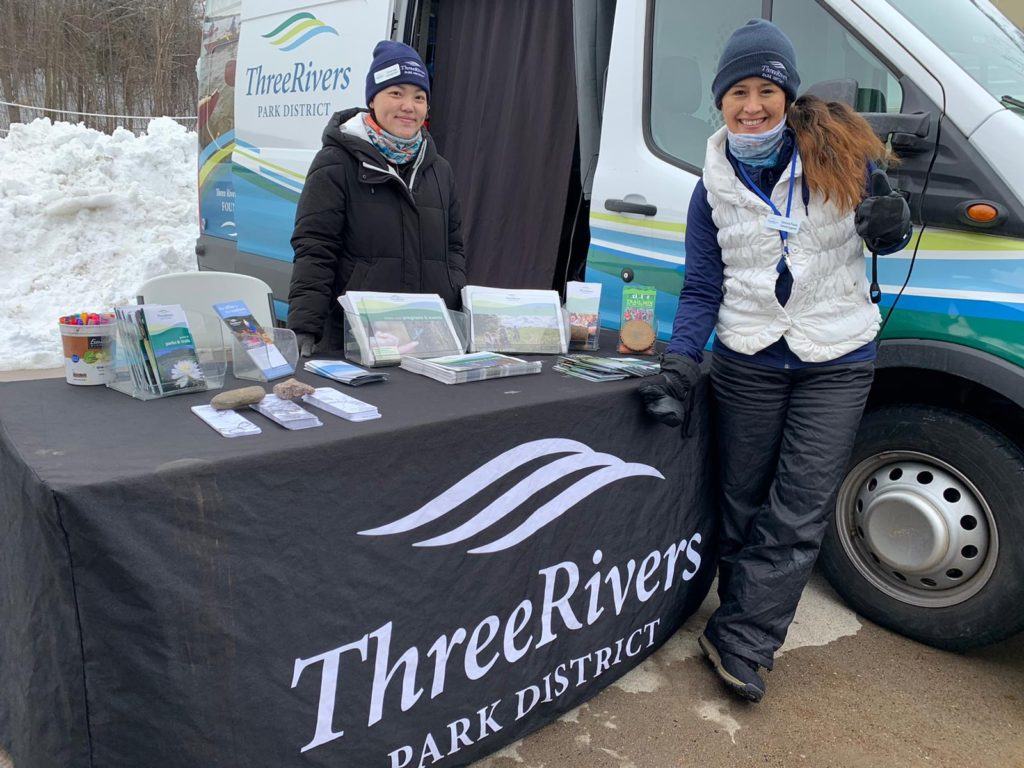
I did also want to mention the other work that Community Engagement does. My colleague Giannina Posner works to promote our Recreation Pass Plus Program, which is geared towards low-income households to provide free or discounted programs and rentals and other opportunities in the parks. Then we have Kaja Vang, who oversees our Teen Council Program. We have a group of teens who come, and they’re sort of like an advisory board to rethink what it means to engage the teen population, whether it’s through social media or providing events specifically for teens. The other part of Kaja’s work is geared towards biking opportunities. We have a fleet of bikes that we bring out into our parks and on our trails do group bike rides with folks. We have also started some adult learn-to-ride programs, affording opportunities for adults who may have never been able to learn how to ride a bike.
Thank you for taking the time to share about the work you are doing Chia!
If you are interested in learning more, visit the Three Rivers Park District website, or contact Chia at Chia.Xiong@ThreeRiversParks.org
Photos provided by Chia Xiong.